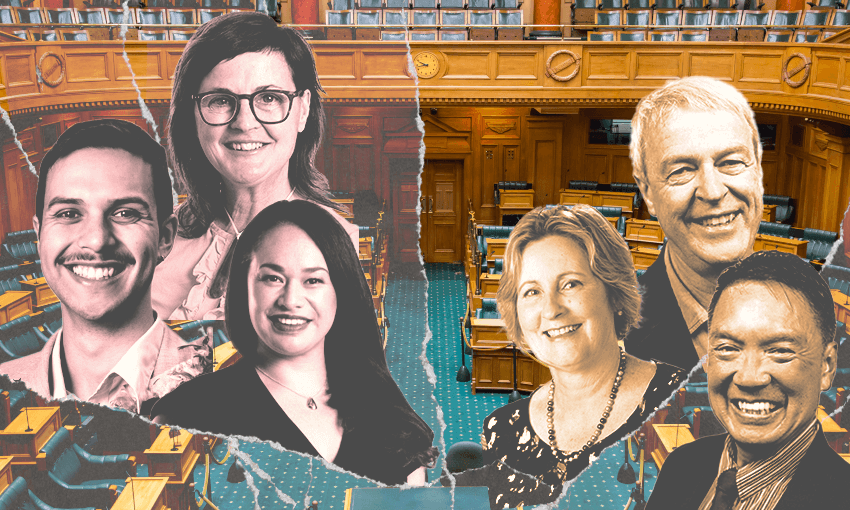No one ever claims parliament is broken because National and Labour don’t get along. So why is it different for the council?
On Friday, The Post splashed its front page with the headline: “We have lost our shine: Capital’s power brokers want city back on track”. The story, which didn’t have a reporter’s name attached to it, read like a press release for the launch of a new local political group, Vision for Wellington.
Vision for Wellington describes itself as a “voice advocating for Wellington and calling for change” and also claims to be “politically neutral”. Those are mutually exclusive concepts.
The “bipartisan and politically neutral” group happens to be mostly (though not exclusively) made up of high-profile conservative partisans: Bob Jones, Kerry Prendergast, Luke Pierson, Myles Gazley, Mike Egan, Simon Woolf… and coincidentally, Sinead Boucher, owner of Stuff and The Post.
It is a strange decision, to put it mildly, for Wellington’s largest media outlet to run a non-bylined fluff story on the front page about its owner’s political advocacy group. The Post has excellent local democracy journalists, but this puts them in an awkward position. No reporter wants their stories to be called into question because of an editorial line being pushed by their senior editors and/or owner.
Advocacy journalism and advocacy groups can be positive forces for civic discussion, but let’s drop the bullshit. Vision for Wellington is not a non-political group, and The Post is not behaving like neutral media.
The Post’s story attributes this quote to the group’s unnamed spokesperson: “Infrastructure is outdated, businesses are closing, and people are moving away. We need a boost. It’s time to do something about it.” The thing is, Wellington City Council is doing something about it. Say what you like, but this is not a do-nothing council. The new rules for high-density housing, the rapid cycleway rollout, bus lanes, the Golden Mile upgrade, Courtenay Precinct, pedestrianised streets, and plans to develop a Clean Tech industry are all big moves with city-shaping potential. The council is getting shit done; it’s just not the shit that Vision for Wellington or the senior editors of The Post want.
Vision for Wellington’s website criticises “the city council’s handling of the city’s finances – in particular, its inability to rein in spending”. Wellington has had steep rates increases, like almost every council nationwide – but low spending and low rates are not an objective, politically neutral ideal. It’s a partisan position. There are some voters for whom low rates are the most important issue and some voters who are willing to pay higher rates in order to get the services that matter to them.
One of the most frustrating myths about local government is that it is possible to achieve some neutral, platonic ideal of governance if only all politics got out of the way. Karl Tiefenbacher, who ran in the council byelection earlier this year, made this a point of his campaign, saying, “There is no room for politics on local councils.” This idea seems to be more prevalent on the right, but the left isn’t immune either. Everyone thinks their vision of the world is common sense and rational, while those on the other side are partisan hacks.
The Vision for Wellington website says the group was formed due to “frustration at in-fighting and perceived ideology-fuelled decision-making”. This line gets repeated so often that is has become a cliché, but that doesn’t make it any less stupid. Councillors are politicians. They’re elected to have views and fight hard for them. The fact that Wellington City councillors constantly disagree with each other isn’t a bug, it’s a feature. It’s the point of democracy. No one ever claims parliament is dysfunctional because National and Labour don’t get along. Wellington is a political town full of people with strongly held and deeply informed ideas about the world. That’s one of the city’s great strengths.
Why do the progressive councillors disagree with conservative councillors? Because they’re politicians. Why do Diane Calvert and Ray Chung constantly leak things to the media? Because they’re politicians. Why did Tamatha Paul and Fleur Fitzsimons do the same thing when Andy Foster was mayor? Because they’re politicians. Why did Ben McNulty and Nureddin Abdurahman kick up such a fuss about the airport sale? Because they’re politicians. Why did Nicola Young go on The Platform to amplify false rumours about a scandalous video of the mayor? Because she’s a politician with an especially loose moral compass.
Why has local government minister Simeon Brown been so eager to suggest he will replace the council with commissioners? I’ll give you three guesses… That’s right. It’s because he’s a politician – and specifically, a politician who doesn’t align with the majority on the council. Why did Tory Whanau go on Instagram and like comments that called Brown’s threats of government intervention a “hit job”? Because she is a politician, and she is obviously pissed off that Brown is playing political games to undermine her.
When the government replaced the Tauranga City Council with commissioners in 2020, it did so at the mayor’s request. If Brown takes the step to remove Wellington’s elected mayor and council against their wishes, that will be, by definition, an anti-democratic decision. We already have a system for people to remove politicians they don’t like: it’s called an election.
That said, it is entirely appropriate for the government to step in if the council can’t pass a budget or finds itself in financial ruin. Brown’s decision to appoint a Crown observer was fairly sensible – an observer doesn’t really do much, they take a look at the books and check that everything is hunky-dory. But no observer or commissioner will be apolitical – because that is impossible. If Brown appoints someone who comes in to cut spending, cancel cycleways or scrap the Golden Mile upgrade, it won’t be because it’s the objectively correct way to govern. It will be because of politics.

